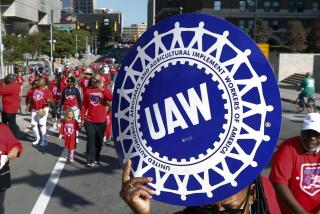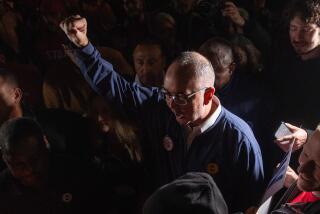Labor Groups Will Seek Tobacco Funds for Union Members
- Share via
WASHINGTON — Officials representing union-administered health funds said Tuesday that they will seek compensation from cigarette makers on behalf of blue-collar workers who could be adversely affected by a pending tobacco industry settlement.
The coalition of workers’ health funds, which provide coverage for union members engaged in trades such as construction, trucking and garment-making, said it will seek its own reimbursement for funds spent to treat tobacco-related illnesses.
The amount of money involved, it said, could rival the $368.5 billion that tobacco companies have agreed to pay to states under a settlement negotiated by a group of state attorneys general.
If the tobacco agreement is accepted by Congress, class-action suits against the industry would be prohibited, although individual smokers could still sue. The coalition seeks either to be reimbursed as part of the current settlement or to be allowed to pursue individual class-action suits and separate negotiations with the industry.
This marks the first of what could be many requests by private groups to be included in the settlement, which currently calls for the reimbursement of only state Medicaid costs. Some critics of the deal, such as Sen. Edward M. Kennedy (D-Mass.), have already said they will seek recompense for the costs of patients covered by Medicare and the Veterans Administration.
The chairman of the union coalition, Brian McQuade, said the settlement, as currently worded, signs away the legal rights of blue-collar workers without repaying their medical costs.
“We cannot support the current settlement,” McQuade said. The attorneys general who won the accord “did not have the right to negotiate away our rights to lawful claims.”
Union health funds in 16 states have already filed class-action suits seeking damages from the tobacco industry, and 10 more are expected to do so in the coming days, according to McQuade, who also oversees the Laborer’s Health and Safety Fund of North America.
Multi-employer health funds provide health care to more than 30 million workers, in industries characterized by small employers and transient work patterns.
McQuade said blue-collar workers have been specifically targeted by tobacco marketing campaigns, causing the percentage of smokers among the members of labor-management health funds to reach levels that are double the national percentage.
Because the money allotted to these funds is determined by collective-bargaining agreements between unions and employers, McQuade says, “every dollar spent for a smoking-related disease is a dollar that would otherwise have gone into the paychecks of our workers.”
Mississippi Atty. Gen. Mike Moore, lead negotiator for the anti-tobacco forces, said that under the recent deal, there is a possibility of unions and public trusts recovering money in future lawsuits. The settlement allocated a $5-billion annual fund to cover suits successfully pursued by individuals. If the fund is not used up in a given year, it would be used for public health purposes, which could include covering damages to public groups, he said.
The union coalition’s action adds another potential complication to congressional approval of the settlement.
Phil Schiliro, an aide to Rep. Henry A. Waxman (D-Los Angeles), said this kind of “me too” request is to be expected in the wake of the settlement effort.
“It is inevitable . . . when you talk about cutting off people’s ability to get compensation,” Schiliro said. “If this legislation is passed, it will kind of be the last train leaving the station, and everybody will want to be on that train.”
More to Read
Sign up for Essential California
The most important California stories and recommendations in your inbox every morning.
You may occasionally receive promotional content from the Los Angeles Times.










